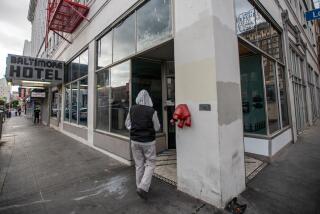Settlement Reached in Legal Battle Over $420-Million Charitable Trust
- Share via
SAN RAFAEL, Calif. — Lawyers for the San Francisco Foundation said Friday that a settlement has been reached in the legal fight over the future of the $420-million Buck Trust, one of the largest charitable foundations in the United States.
Under the agreement, the San Francisco Foundation would turn over administration of the trust to a Marin County-based foundation, to be formed later this year. The San Francisco Foundation would receive more than $6 million in legal fees and “transition” costs.
This agreement is considered almost certain to be accepted by Judge Homer Thompson, who took an active part in settlement negotiations after being called in from Santa Clara County Superior Court to conduct the case.
However, it is not clear whether the agreement will end the battle over the trust, a battle that hinges on the will of a wealthy heiress and has come to be known as the “Super Bowl of probate law.”
A group of 46 charities not eligible to benefit from the trust opposes the settlement, and Thompson said he will allow that group to continue an independent challenge to the trust’s use until he rules whether a settlement would render their argument moot.
The proposed settlement was sharply criticized both in and out of court by Sid Wolinsky of the public-interest law firm Public Advocates Inc., which represents the 46 charities.
“It has completely sold out the interests of the poor and needy--apparently with the blessings of a judge,” Wolinsky said. “It’s a complete sellout . . . a disgrace, an embarrassment.”
Lawyers for the various parties who agree with the settlement shrugged off the criticism, saying that the facts simply do not justify breaking the will that established the trust.
Beryl H. Buck, a wealthy Ross, Calif., philanthropist, created the trust in 1975 when she bequeathed a $10-million share in a small oil company for the benefit of needy people in Marin County, the second wealthiest county in the nation.
Value of the trust has swollen to more than $400 million since the company was bought by Shell Oil Co. at the height of the 1979 oil crisis.
With so much money to spend and relatively few needy people to benefit, proceeds from the trust have been used to finance a variety of philanthropic projects, from cultural programs to a bicycle path.
The San Francisco Foundation, aided by Public Advocates, petitioned in 1984 to remove the Marin-only restriction on the trust.
Marin County and a group of Marin-based charities opposed the move, rejecting the petitioners’ assertions that Buck would not have excluded charities in other counties from benefits had she known that the trust would grow so much.
Forced to Negotiate
During the trial, which began in February, the county forced the foundation into negotiations by winning several key rulings, including one that prevented the needs of nearby counties from being considered.
Those successes continued Friday when Thompson, in a series of heated exchanges, rejected pleas by Public Advocates to declare a mistrial and to delay further proceedings until the firm’s lawyers could prepare to argue their case without the help of the foundation.
Marin County Counsel Douglas Maloney doubts that Public Advocates will succeed.
“You have to look at the record (so far in the case), and the record shows that there’s no basis for cy pres,” he said.
Cy pres, the basis of the original petition to change Buck’s will, is a legal concept that allows for the changing of wills if the conditions under which they are written have changed radically--for example, changing a bequest for pioneer wagon trains to benefit modern travelers in automobiles.
Effort to Continue
Public Advocates’ effort to invoke cy pres will continue next Friday, one day after the other parties in the case present their proposed settlement in more detail.
Generally, that proposal calls for the foundation to resign as the trust administrator and to drop its challenge to the Marin-only clause.
In exchange, it would receive $3 million to assist in adjusting to the loss of the Buck Trust, which makes up about two-thirds of its assets; it also would be reimbursed for its legal fees in the case, which one lawyer estimated at more than $3 million.
The trust then would be put in the hands of a new, as-yet unformed foundation to be known as the Marin Community Foundation, which would use income from the trust to benefit Marin charities only. The transition would occur on Jan. 1, 1987, according to the proposed settlement agreement.
Protects Assets
Lawyers who drafted the settlement said it will end a legal battle that could not be won, and will do so in a way that protects both the intent of Buck’s will and the assets of the foundation it established.
“On this day of a new beginning, it will undoubtedly be said that one side won out over the other or that one side capitulated to the other,” said Deputy Atty. Gen. Yeoryios C. Apallas, who represented the state’s opinion that no change in the will should occur.
“That is beside the point. There is only one winner today, and that is Mrs. Beryl Buck. Her will will be done--in perpetuity.”
More to Read
Sign up for Essential California
The most important California stories and recommendations in your inbox every morning.
You may occasionally receive promotional content from the Los Angeles Times.













